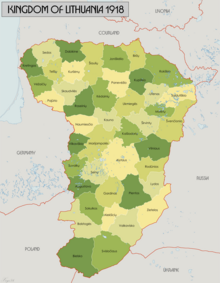
Back مملكة ليتوانيا (1918) Arabic Каралеўства Літва (1918) Byelorussian Летува (каралеўства, 1918) BE-X-OLD Litevské království (1918) Czech Königreich Litauen German Reino de Lituania (1918) Spanish Lituaniako Erresuma (1918) Basque Liettuan kuningaskunta (1918) Finnish Royaume de Lituanie (1918) French ממלכת ליטא (1918) HE
Kingdom of Lithuania | |||||||||||||||
|---|---|---|---|---|---|---|---|---|---|---|---|---|---|---|---|
| 1918 | |||||||||||||||
 Map of the Kingdom of Lithuania (1918) | |||||||||||||||
| Status | Client state of the German Empire | ||||||||||||||
| Capital | Vilnius | ||||||||||||||
| Common languages | Lithuanian Polish Belarusian Russian | ||||||||||||||
| Religion | Roman Catholic | ||||||||||||||
| Demonym(s) | Lithuanian | ||||||||||||||
| Government | Unitary constitutional monarchy under a provisional government | ||||||||||||||
| King-elect | |||||||||||||||
• 1918 | Mindaugas II | ||||||||||||||
| Legislature | Council of Lithuania | ||||||||||||||
| Historical era | World War I | ||||||||||||||
| 18 September 1917 | |||||||||||||||
| 16 February 1918 | |||||||||||||||
| 3 March 1918 | |||||||||||||||
• Recognized by Germany | 23 March 1918 | ||||||||||||||
• Monarchy proclaimed | 4 June 1918 | ||||||||||||||
| 11 July 1918 | |||||||||||||||
• Monarchy suspended | 2 November 1918 | ||||||||||||||
| 11 November 1918 | |||||||||||||||
| |||||||||||||||

The Kingdom of Lithuania was an attempt to establish an independent constitutional Lithuanian monarchy in February 1918. It was created towards the end of World War I when Lithuanian-speaking lands were under military occupation by the German Empire. The state was officially dissolved in November 1918.
The Council of Lithuania declared Lithuania's independence on 16 February 1918, but the council was unable to form a government, police, or other state institutions due to the continued presence of German troops. The Germans presented various proposals to incorporate Lithuania into the German Empire, particularly Prussia. The Lithuanians resisted this idea and hoped to preserve their independence by creating a separate constitutional monarchy.
On 4 June 1918, they voted to offer the Lithuanian throne to the German noble Wilhelm Karl, Duke of Urach. He accepted the offer in July 1918 and took the regnal name Mindaugas II. However, he never visited Lithuania. His election stirred up controversy, divided the council and did not achieve the desired results. As Germany was losing the war and was engulfed in the German Revolution, Lithuania suspended its decision to invite the Duke on 2 November 1918, thereby ending his reign.
